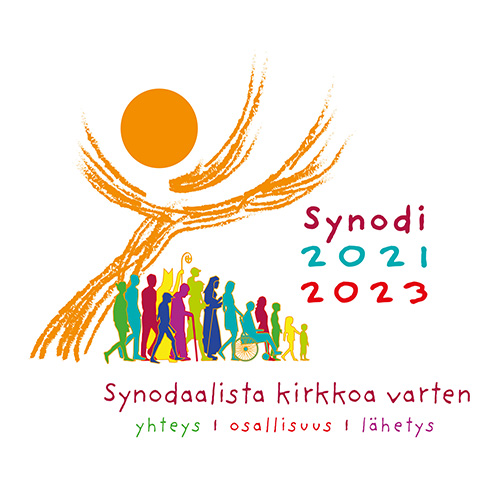
The Bishop of Helsinki on Fiducia Supplicans

Read here the Statement on Fiducia Supplicans made by the Bishop of Helsinki, mons. Raimo Goyarrola:
– Statement on Fiducia Supplicans (27.12.2023) (pdf)
KATT
Statement on the Declaration Fiducia Supplicans of the Dicastery for the Doctrine of the Faith
The Dicastery for the Doctrine of the Faith recently published a declaration called Fiducia Supplicans (“Supplicating Trust”) “on the pastoral meaning of blessings.” The Pope ratified the document on Dec. 18, 2023.
The aim of the declaration is to respond to questions about the possibility of blessing couples living in so-called “irregular unions”, as well as same-sex couples in the Catholic Church.
The Presentation of the declaration states that this declaration “remains firm on the traditional doctrine of the Church about marriage, not allowing any type of liturgical rite or blessing similar to a liturgical rite that can create confusion.”
In order to understand the message of the declaration, it is essential to consider what is stated about the nature of the Church towards the end of the document (43–44). The Church is the sacrament of God’s infinite love and mercy. Therefore, even when a person’s relationship with God is clouded by sin, he can always ask for a blessing, just as Peter did in the storm when he cried out to Jesus, “Lord, save me!” (Mt. 14:30).
Administering a blessing is always an opportunity for the Church to declare the Good News about Jesus Christ and to invite people to turn even more towards the love of God. In this pastoral light of the declaration, which seems to reflect the thinking of Pope Francis well, the possibility to bless couples in irregular unions and those in same-sex partnerships can be understood without their unions receiving ecclesiastical approval.
1. What do ”to bless” and ”a blessing” mean?
Fiducia Supplicans offers a new and innovative view to understand the pastoral meaning of blessings. The document broadens and enriches the classical understanding of blessings, which has often been strictly tied only to their liturgical aspect.
a) Liturgical Blessings (for the Sacrament of Marriage)
First, the declaration briefly introduces what is meant by a blessing in the Sacrament of Matrimony (4–5), and affirms the traditional teaching of the Church about marriage: marriage is the exclusive, stable, and indissoluble union between a man and a woman, naturally open to the generation of children. Due to moral principles, the Church does not have the power to impart blessings to unions consisting of individuals of the same sex. A liturgical blessing requires that what is blessed be conformed to God’s will, as expressed in the teachings of the Church. The Church has the duty to avoid any ritual that might contradict this teaching or lead to confusion.
b) Non-liturgical Blessings (Pastoral Blessings)
Fiducia Supplicans introduces a new point of view, however, of a pastoral meaning of blessings. It searches for a theological-pastoral approach, which could allow non-liturgical blessings. These are blessings which people spontaneously ask the priest to administer in various situations. They are described as acts of devotion that are external to the celebration of the Holy Eucharist and of the other sacraments, such as when visiting shrines, on pilgrimages, or meeting a priest (28). These expressions of devotion are part of popular piety and, as such, their language, rhythm, course, and theological emphasis differ from those of the corresponding liturgical action (24).
According to the declaration, the same moral conditions that are called for in the reception of the sacraments should not be placed on non-liturgical blessings (12). In any case, the person asking for a blessing recognizes himself to be in need of God’s saving presence in his life. To seek a blessing in the Church helps us to move forward, to live better, and to respond to the Lord’s will (20, 21). A blessing possesses a special power, which disposes man’s heart to be changed by the mercy of God (27).
The declaration emphasizes that the form of these non-liturgical blessings should not in any way be fixed ritually in order to avoid producing confusion with the blessing proper to the Sacrament of Marriage (31). In addition, these blessings should never be imparted in concurrence with the ceremonies of a civil union, and not even in connection with them. Nor can they be performed with any clothing, gestures, or words that are proper to a wedding (39).
While a priest may use pastoral prudence and wisdom (see 30), he may not sanction or legitimize the irregular union itself (31, 34, 40). The declaration defines that in the prayer which may precede this spontaneous blessing, the ordained minister could ask that the individuals have peace, health, a spirit of patience, dialogue, and mutual assistance, but also God’s light and strength to be able to live fully according to the will of God (38).
The Dicastery for the Doctrine of the Faith does not intend to sanction or legitimize anything through this declaration but rather to open the lives of those in irregular situations to God, to ask for his help to live better, and also to invoke the Holy Spirit so that the values of the Gospel may be lived with greater faithfulness (40).
2. Potential Causes of Confusion
With a synodal spirit I have listened to the views on the declaration of multiple priests, religious and lay people of our Diocese. It is not my meaning to offer a detailed list of all the points of confusion which were brought forth. Instead, I will gather the doubts in five points which summarize the confusion of some people, and I will also propose a possible response in light of this new declaration.
a) The word ”blessing” seems ambiguous in the declaration, whereas in some languages the semantic of a blessing is clear: e.g. in Latin benedicere (“bene-dicere”) means speaking positively of someone (even praising) and, on the other hand, that someone is talked to positively, someone is wished good. But it can also mean approval and, as a consequence, acceptance, acknowledgement. Thus, to many people this may easily cause confusion.
A clear distinction is made in the declaration between liturgical or ecclesiastical blessings (these take place publicly, using a rite approved by the Church) and non-liturgical or pastoral blessings (these are personal, rather having to do with one’s conscience). The latter is new, and refers to forms of blessings which express a supplication that God might grant aid and mercy to those requesting the blessing, so that their human relationships might mature and grow in fidelity to the Gospel, that they might be freed from their imperfections and frailties, and that they might express themselves in the ever-increasing dimension of the divine love (31).
b) The declaration discusses how to bless a couple living in an irregular situation or with a partner of the same sex without giving a blessing to the union itself. However, what makes two people a couple is a specific kind of relationship, union, or status between them (whether by law or at the emotional level). As a consequence, it may be difficult to distinguish the blessing of a couple from blessing the union which forms the couple.
A non-liturgical pastoral blessing is an act of pleading to God for those that humbly turn to Him. It is a simple gesture, which provides an effective means of increasing trust in God on the part of the people who ask for it (36). Here two people are blessed together – people, who live as a couple, even as not everything they do is approved. As a consequence, their status as a couple is not blessed. However, something good can be seen in their relationship, such as friendship, care for one another, loyalty, etc.
c) The declaration requires that all symbolism that would resemble a liturgical blessing for the union be avoided when giving blessings to these couples. Still, the priest giving the blessing is always a servant of Christ. It is difficult to understand how a blessing given by a priest could be completely non-liturgical. The blessing of a priest always has an evangelical and catechetical dimension, and it may therefore never contradict Catholic teaching.
While this is true, not everything a priest does is liturgical (spiritual direction, spontaneous prayers, asking for aid, and so forth) and in this sense we may understand giving a blessing to these couples. These kinds of spontaneous blessings given in certain individual cases are personal prayers of the faithful, which a priest may join at their request.
d) The declaration states that both liturgical and non-liturgical blessings are sacramentals (8). The Catechism of the Catholic Church discusses sacramentals as part of the chapter called “Other Liturgical Celebrations” (Cathechism of the Catholic Church 1667-1676). This suggests that every sacramental is liturgical in nature. Unfortunately, the claim of the declaration may cause the exact kind of confusion which it wishes to avoid, that is, that the non-liturgical blessing is interpreted as the legitimization of a union of those living in irregular situations.
While popular piety is also discussed in the Catechism under the same title ”Other Liturgical Celebrations”, this does not make popular piety liturgical. A non-liturgical blessing belongs to popular devotion, a prayer, an act of devotion, which unites intercessory prayer with the invocation of God’s help by those who humbly turn to him. A blessing offers people a means to increase their trust in God. The request for a blessing, thus, expresses and nurtures openness to the transcendence, mercy, and closeness to God in certain circumstances of life (33).
e) It may be that some couples wish to ask for a blessing as a sign that the Church acknowledges their union.
The declaration emphasizes in various ways that a blessing is given to those who recognize themselves to be destitute and in need of God’s help, and who do not claim a legitimation of their own status, but who beg that all that is true, good, and humanly valid in their lives and their relationships be enriched, healed, and elevated by the presence of the Holy Spirit (31).
3. The Church as the Sacrament of Love
The Church receives all those who approach God with a humble heart. This humble heart naturally presupposes a wish for metanoia, an internal conversion, and changing of our ways of life to increasingly resemble the Gospel of Christ. In this way a blessing may become a true gift, instead of an empty or contradictory gesture.
We in the Catholic Church in Finland and in the other Nordic Countries have a beautiful tradition of the priest giving a blessing to all who wish to approach the Lord at Holy Mass during the distribution of the Eucharist. Receiving a Sacrament is always also a public witness of the person living and wanting to live fully according to the Faith of the Church. But even if the person did not live fully according to Catholic Faith, or did not even belong to the Catholic Church, he can still always come to receive a blessing from the priest distributing Communion. The only requirement is a humble heart and the wish to open oneself to the healing action of God. God calls each of us equally to this path of continual conversion, without separating anyone, through the Church, which in herself is a sacrament of God’s infinite love and mercy.
In Helsinki on Dec. 27, 2023
on the Feast of St. John the Evangelist
+ Raimo Goyarrola
Bishop of Helsinki





























